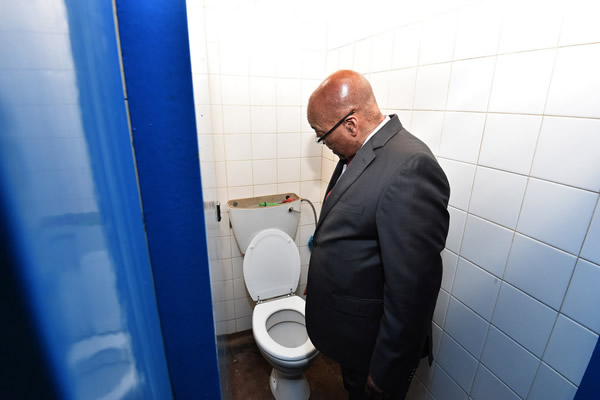No special treatment for Jacob Zuma in prison
No special treatment for Jacob Zuma in prison

Supporters of former president Jacob Zuma fired gunshots as they led a motorcade from Eshowe to his rural homestead of Nkandla in northern KwaZulu-Natal in a show of force on Thursday.
The entrance to Zuma’s home was a hive of activity as supporters clad in ANC regalia gathered, singing and dancing, to deliver a clear message: “Zuma is not going to jail even if he elects to do so.”
It started with a motorcade, claiming to be ANC members from the eThekwini region, that had assembled in Eshowe. The bumper-to-bumper procession, comprising mostly SUVs and luxury vans reverberating with music, was not without drama as guns were discharged amid singing and dancing.
Onlookers waved and ululated.
At one point, the road was turned into a one-way, with oncoming traffic forced aside and no law enforcement officials in sight.
Supporters vowed they would remain at Zuma’s house until he was required by law to hand himself over to police.
“We are here with a single mission. Our message is clear: we say what is happening to Zuma is wrong and unfair,” said Lindani Sicwala, ANC branch chairperson in the eThekwini region.
“We are saying he is going nowhere. We will sleep here and wake up here and if the police come [to arrest him] they will have to do so with a helicopter because we will stop them.”
“We do not care what Zuma says, we will defend him by any means necessary,” said SA National Civic Organisation (Sanco) Youth Congress spokesperson Thulani Gamede. “He is not going anywhere; no-one will arrest him. Whoever thinks they can do that must go through us. If they succeed we are going to jail with him, otherwise all hell will break loose.”
The Constitutional Court has given Zuma until Sunday to hand himself over to either the Nkandla or Johannesburg Central police station, failing which police minister Bheki Cele and police commissioner General Khehla Sitole “must” arrest him.
The jailing of the former president for contempt of court will be a first in SA’s constitutional democracy. While Zuma enjoys presidential privileges for life, correctional services officials say there are “no presidents” and “only inmates” in jail.
“He will be treated like everyone else,” said prisons spokesperson Singabakho Nxumalo. His assertion will be tested when Zuma begins his 15-month jail term.
After serving half their sentence, inmates are eligible to apply for parole. Criminal attorney William Booth told Business Day that, as a result of the lockdown, Zuma could be up for parole long before that.
“With Covid-19 and particularly now under level 4, what the prisons have done with people who go in, offenders who are not sentenced for violent crime [get] released quickly,” Booth said. “He could be in for a very short time, because they are trying to clear the prisons.”
Zuma remains an accused in a separate criminal matter and is due to appear in the Pietermaritzburg high court in three weeks for the arms deal trial. Last month judge Piet Koen ordered Zuma’s legal team to file heads of argument by July 5.
These papers will include the main reasons why, in Zuma’s view, state prosecutor Billy Downer must recuse himself on the grounds of bias. Lawyers say Zuma’s jail sentence will have little or no bearing on his ongoing corruption trial. Koen’s adjudication on the recusal bid is set down for July 19.
Amanda Vilakazi, an attorney who sits on the Law Society of SA’s criminal law committee, agreed that Zuma’s sentence for contempt will not affect his arms deal trial. She said it could affect his sentence, if he is found guilty. “He will have to submit to the court that he is not a first-time offender,” she said.
Booth said lockdown regulations would affect Zuma more than the 15-month sentence itself. “I think that is the big thing. He can’t meet up with his counsel whenever he wants to; they can’t just consult for hours on end,” he said.
Booth raised the recent changes to Zuma’s legal team. In May, attorney Mondli Thusini replaced Eric Mabuza and advocate Dali Mpofu joined advocate Thabani Masuku. “Because of the problems with consultation during the lockdown, there are practical problems with consulting with people in prison,” said Booth. “It could certainly lead to a request for a postponement if they’re not able to adequately consult.”
Llewellyn Curlewis, a senior law lecturer at the University of Pretoria, was sceptical about Nxumalo’s claim that Zuma would be treated like any other inmate. “He might have his own prison cell, he might — whether we like it or not — be treated slightly different from your regular prisoner,” Curlewis said.
Correctional services assess inmates on arrival, and security concerns can be a factor in where they place prisoners. Nxumalo said the assessment included an evaluation of an inmate’s health, including mental health, the risk of them taking their own life, and assessments on vulnerability and security. Zuma could be placed in a hospital cell, and could be granted perks including a TV, Curlewis said.
Regarding his attire, Zuma is obliged to wear orange overalls while in prison. “Every sentenced inmate must wear an orange uniform. They wear private shoes or, when we have stock available, we do give them shoes,” said Nxumalo.
But Zuma will appear before Koen in plain clothes. “Our regulations are clear […] you’ll not see any person in court wearing prison uniform,” Nxumalo said.
Comments are closed.